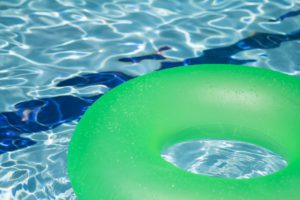
Maintaining a pristine pool isn’t just about aesthetics but also safety and hygiene. One of the essential aspects of pool maintenance is the proper use of pool chemicals. In this article, we’ll dive into pool chemicals, exploring their importance, types, and best practices to ensure your pool remains a sparkling oasis of relaxation.
Importance of Pool Chemicals:
Pool chemicals are vital in keeping your pool water safe and clean for swimming. They help to disinfect the water, killing harmful bacteria and other microorganisms that can cause illness. Additionally, pool chemicals help to balance the pH levels of the water, preventing corrosion of pool equipment and irritation to swimmers’ skin and eyes.
Types of Pool Chemicals:
- Chlorine: Chlorine is perhaps the most well-known pool chemical, commonly used as a sanitiser to kill bacteria and algae in the water. It comes in various forms, including chlorine tablets, granules, and liquid. Chlorine should be added regularly to maintain a proper free chlorine level in the pool.
- pH Adjusters: Maintaining the correct pH level is crucial for balanced pool water. pH adjusters, such as pH increasers (sodium carbonate or soda ash) and pH decreasers (sodium bisulphate or muriatic acid), help regulate the water’s acidity or alkalinity. The ideal pH range for pool water is typically between 7.2 and 7.6.
- Alkalinity Increasers: Alkalinity acts as a buffer to prevent rapid fluctuations in pH levels. Sodium bicarbonate, or baking soda, is commonly used to raise alkalinity levels in pool water.
- Algaecides: Algae can quickly spread and thrive in pool water, causing it to become cloudy and unsanitary. Algaecides are chemicals designed to kill and prevent algae growth, helping to keep the water clear and algae-free.
- Shock Treatments: Shock treatments, also known as superchlorination, involve adding chlorine to the pool to kill bacteria, algae, and other contaminants rapidly. Shocking the pool should be done regularly, especially after heavy pool usage or periods of hot weather.
 Best Practices for Pool Chemical Use:
Best Practices for Pool Chemical Use:
- Read and Follow Instructions: Always carefully read and follow the manufacturer’s instructions when handling pool chemicals. Improper use can lead to ineffective treatment or even dangerous chemical reactions.
- Wear Protective Gear: When handling pool chemicals, wear appropriate protective gear, including gloves and goggles, to prevent skin and eye irritation.
- Store Chemicals Safely: Store pool chemicals in a cool, dry place out of reach of children and pets. Keep them tightly sealed in their original containers to prevent spills and contamination.
- Test Water Regularly: Use a pool water testing kit to monitor the chemical levels in your pool regularly, including chlorine, pH, alkalinity, and calcium hardness. Adjust chemical levels as needed to maintain proper water balance.
- Maintain Proper Ventilation: When adding chemicals to the pool, ensure adequate ventilation to prevent the buildup of fumes. Avoid breathing in chemical vapours, and never mix different pool chemicals.
- Follow a Routine Maintenance Schedule: Develop a routine maintenance schedule for your pool, including regular cleaning, testing, and chemical treatment. Consistent upkeep will help keep your pool water clean and safe for swimming.
- Monitor Water Quality: Alongside regular chemical treatment, keeping an eye on the overall quality of your pool water is crucial. Look out for signs of cloudy water, unusual odours, or excessive foaming, as these could indicate imbalances in chemical levels or other issues. Additionally, be vigilant for any debris or foreign objects that may have fallen into the pool, as these can affect water quality and circulation.
- Seek Professional Assistance: While homeowners can manage many aspects of pool maintenance, there are times when it’s best to seek professional assistance. If you need clarification on proper chemical treatment or water testing, or if you encounter persistent issues with your pool water despite your efforts, feel free to consult with a professional pool technician. They have the expertise and specialised equipment to diagnose and address more complex pool problems effectively.
- Educate Pool Users: Lastly, it’s essential to educate all pool users, including family members and guests, about pool safety and hygiene practices. Encourage everyone to shower before entering the pool, avoid urinating or defecating, and refrain from consuming food or drinks while swimming. By promoting responsible behaviour and awareness of pool etiquette, you can help maintain a clean and safe swimming environment for everyone to enjoy.
Proper maintenance of pool chemicals is essential for preserving the integrity of your pool and ensuring a safe and enjoyable swimming experience. By understanding the different types of pool supplies and chemicals, following best practices, and staying vigilant about water quality, you can keep your pool water clean, clear, and inviting. Remember to prioritise safety, seek professional assistance when needed, and educate pool users about responsible behaviour to create a welcoming and hygienic swimming environment for all.
